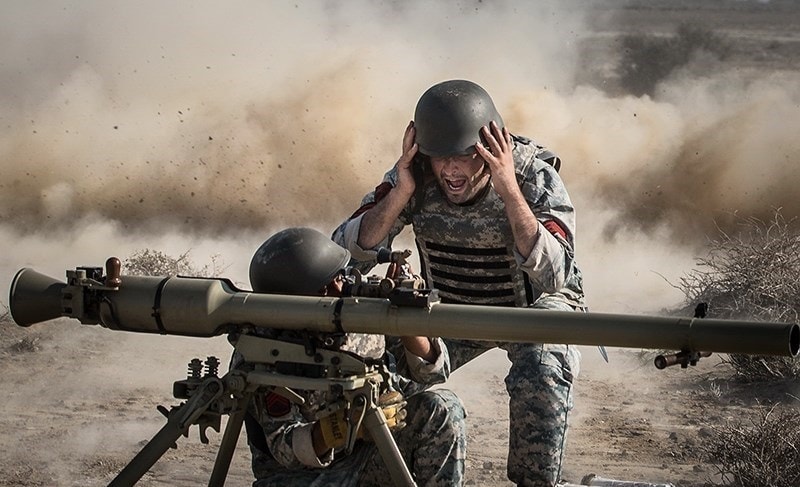Iranian-state media outlets reported that a general in the Islamic Revolutionary Guard Corps (IRGC) was killed in Syria this week. The death of Abolfazl Alijani, an alleged “military adviser” to the regime, is the latest blow in a series of mysterious casualties that have plagued Tehran this year. This incident also comes amidst the frequently evolving context between Iran, Israel, and the United States.
As Iran’s nuclear development has increased, the Jewish state has carried out more consistent air strikes and targeted operations aimed at taking out its regional assets. This escalation has coincided with the Biden administration’s efforts to revitalize a joint U.S.-Iranian nuclear deal in Vienna. The death of the IRGC general could influence the trajectory of these moving pieces.
Iran’s High-Ranking Official in the Ordinary Ground Forces
Alijani, a high-ranking IRGC official, was reportedly killed on an advisory mission in Syria. According to the London-based Iran International, the general was a known member of the IRGC’s ordinary ground forces and not its elite Quds Force unit. The IRGC functions as the regime’s preferred military branch, which it uses to export the guiding principles of the Iranian revolution.
In addition to its military components, the IRGC holds a tight grip over the country’s political, economic, and social spheres. Perhaps the most well-known unit within the IRGC it’s the Quds Force – a paramilitary squad that primarily conducts operations abroad. The Quds Force serves as the backbone of Iran’s proxy operations across the region, responsible for training, funding, and providing other forms of assistance to the regime’s aligned militias in the Middle East.
Trump Put the IRGC on the Foreign Terrorist Organization List
Under the Trump administration, the U.S. listed the IRGC as a Foreign Terrorist Organization (FTO) due to its long history of state-sponsored terrorism. While this designation was a central part of Trump’s “maximum pressure” policy regarding Iran, it also grew to be a major sticking point for the current administration.
The ongoing joint U.S.-Iranian nuclear negotiations have stumbled into several roadblocks since commencing last December. In May, the regime threatened to turn away from the negotiations if the White House did not reverse the IRGC’s terror listing. Biden ultimately refused to comply with this demand, leading to the most recent cessation in progress this summer.
Despite setbacks like the IRGC delisting, the Vienna talks have resumed, and the final phase of negotiations is underway. Due to the potential of a revitalized Iran deal, Israel has ramped up its efforts to minimize the regime’s nuclear prowess. Last week, the Israeli Air Force carried out an airstrike mission over Syria, reportedly killing three soldiers in the attack.
According to The Times of Israel, “The Syrian Observatory for Human Rights, a London-based watchdog, claimed the Israeli strike targeted a Syrian army air defense base in the area of Abu Afsa, south of Tartus. The opposition monitor, which relies on a network of informants inside Syria and has been criticized for having unclear funding sources, added that Iran-backed fighters are usually at the base.”
Israel Keeps an Eye on Iran’s Activities
The Jewish state routinely conducts missions targeting Iran’s assets, including nuclear-related facilities, throughout the region. While the regime does not currently possess the capabilities to launch frequent attacks against Israel from its positioning, it utilizes proxy groups and other aligned militias in neighboring countries to do so. For this reason, the IDF targets Iranian assets not just in Iran, but also in Syria and Iraq. Israel does not acknowledge specific strikes and some analysts question whether or not the IDF was behind the Alijani killing. However, the regime will likely blame the Jewish state regardless.
Last month, Iran accused Israel of killing two of its scientists. Although the regime claims the men, Ayoob Entezari and Kamran Aghamolaei, did not hold high positions in any government or scientific capacity, this claim is unlikely to be true. Entezari, according to a New York Times report, was an aerospace engineer. Aghamolaei was believed to be an affiliate of Iran’s Natanz nuclear facility.
A few weeks earlier, Iran accused Israel of murdering a colonel in the IRGC. In 2020 the scientist long suspected by the West of masterminding Iran’s alleged nuclear bomb program was assassinated. In addition to these mysterious deaths, a lethal explosion at Iran’s Parchin military complex in May also caught the regime by surprise. Quadcopter suicide drones struck a building reportedly used for drone research on the complex. The International Atomic Energy Agency (IAEA) had suspected that the IRGC has carried out tests of explosives triggers at Parchin in the past, which could be used in nuclear weapons. Parchin’s nuclear connection and the mode of the attack indicate Israel was the perpetrator.
While Alijani’s death has not yet been claimed, the timing of the incident suggests the Jewish state is responsible. The Israeli government has been vocal in its opposition to a renewed nuclear agreement since Iran’s proximity to acquiring a nuclear weapon is rapidly approaching. As the Vienna talks wrap up and prospects for a deal steadily increase, it may be the IDF’s last chance to remove some of Iran’s assets from the equation.
Maya Carlin is a Middle East Defense Editor with 19FortyFive. She is also an analyst with the Center for Security Policy and a former Anna Sobol Levy Fellow at IDC Herzliya in Israel. She has by-lines in many publications, including The National Interest, Jerusalem Post, and Times of Israel.

